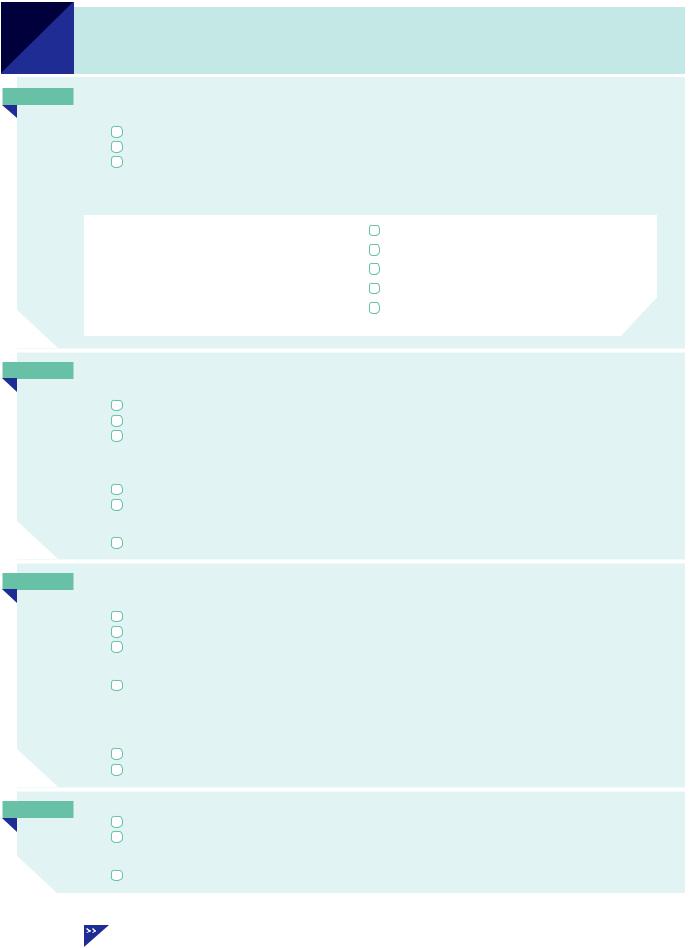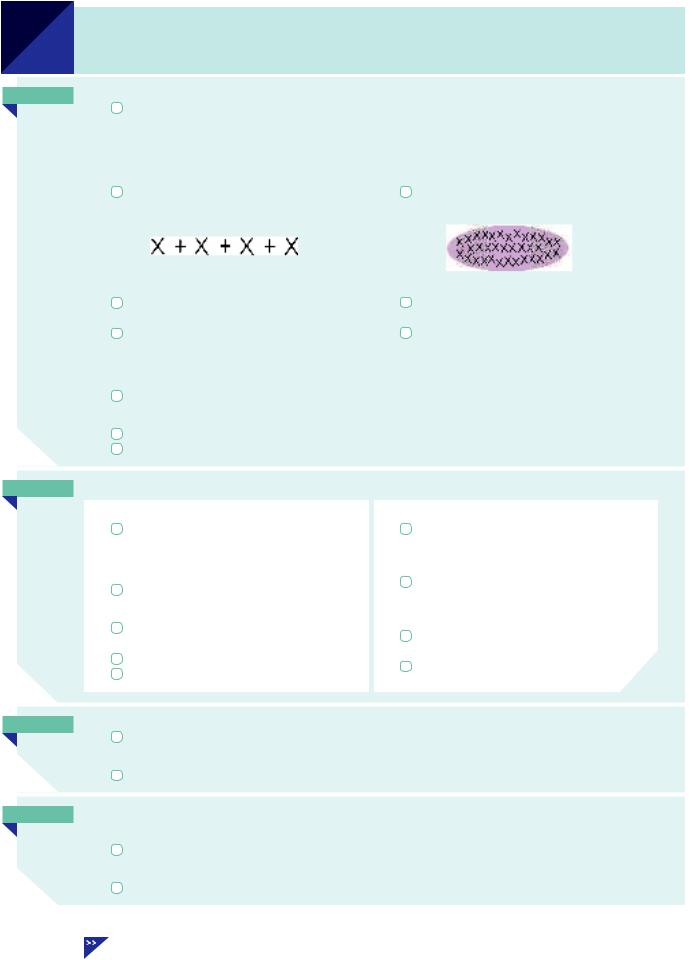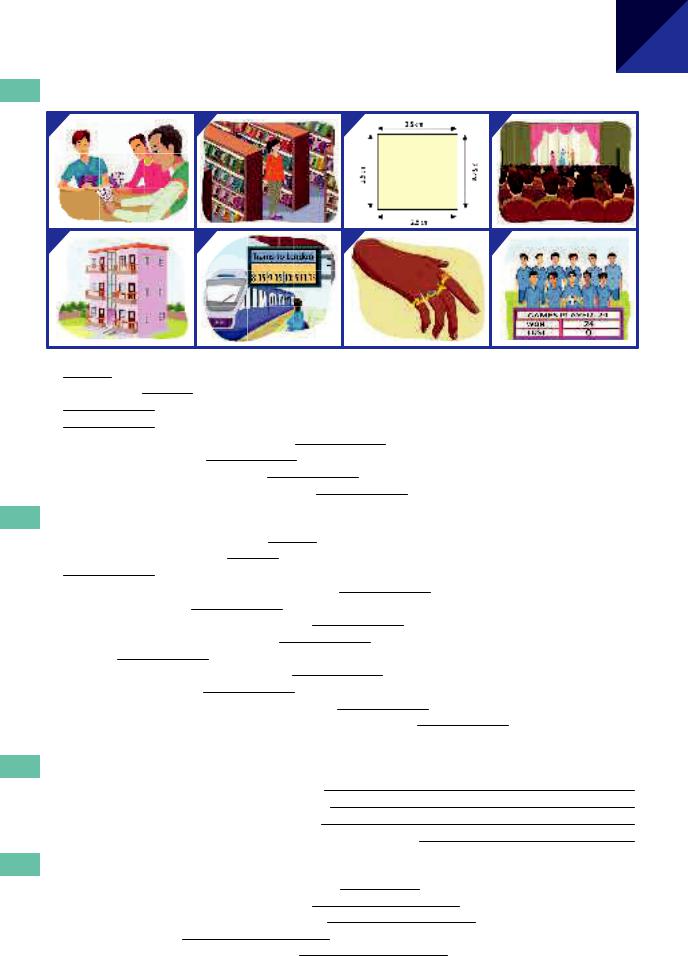
- •Contents
- •Thanks
- •To the student
- •To the teacher
- •3 Present continuous and present simple 1 (I am doing and I do)
- •10 Present perfect continuous and simple (I have been doing and I have done)
- •11 how long have you (been) … ?
- •12 for and since when … ? and how long … ?
- •13 Present perfect and past 1 (I have done and I did)
- •14 Present perfect and past 2 (I have done and I did)
- •15 Past perfect (I had done)
- •16 Past perfect continuous (I had been doing)
- •17 have and have got
- •18 used to (do)
- •19 Present tenses (I am doing / I do) for the future
- •20 I’m going to (do)
- •21 will and shall 1
- •22 will and shall 2
- •23 I will and I’m going to
- •24 will be doing and will have done
- •26 can, could and (be) able to
- •27 could (do) and could have (done)
- •28 must and can’t
- •29 may and might 1
- •30 may and might 2
- •31 have to and must
- •32 must mustn’t needn’t
- •33 should 1
- •34 should 2
- •35 I’d better … it’s time …
- •36 would
- •39 if I knew … I wish I knew …
- •40 if I had known … I wish I had known …
- •41 wish
- •42 Passive 1 (is done / was done)
- •43 Passive 2 (be done / been done / being done)
- •44 Passive 3
- •45 it is said that … he is said to … he is supposed to …
- •46 have something done
- •47 Reported speech 1 (he said that …)
- •48 Reported speech 2
- •49 Questions 1
- •52 Question tags (do you? isn’t it? etc.)
- •53 Verb + -ing (enjoy doing / stop doing etc.)
- •54 Verb + to … (decide to … / forget to … etc.)
- •55 Verb (+ object) + to … (I want you to …)
- •56 Verb + -ing or to … 1 (remember, regret etc.)
- •57 Verb + -ing or to … 2 (try, need, help)
- •58 Verb + -ing or to … 3 (like / would like etc.)
- •59 prefer and would rather
- •60 Preposition (in/for/about etc.) + -ing
- •61 be/get used to … (I’m used to …)
- •63 there’s no point in -ing, it’s worth -ing etc.
- •64 to … , for … and so that …
- •65 Adjective + to …
- •66 to … (afraid to do) and preposition + -ing (afraid of -ing)
- •67 see somebody do and see somebody doing
- •68 -ing clauses (He hurt his knee playing football.)
- •69 Countable and uncountable 1
- •70 Countable and uncountable 2
- •71 Countable nouns with a/an and some
- •74 the 2 (school / the school etc.)
- •75 the 3 (children / the children)
- •77 Names with and without the 1
- •78 Names with and without the 2
- •79 Singular and plural
- •80 Noun + noun (a bus driver / a headache)
- •81 -’s (your sister’s name) and of … (the name of the book)
- •82 myself/yourself/themselves etc.
- •83 a friend of mine my own house on my own / by myself
- •84 there … and it …
- •85 some and any
- •87 much, many, little, few, a lot, plenty
- •90 all every whole
- •91 each and every
- •92 Relative clauses 1: clauses with who/that/which
- •94 Relative clauses 3: whose/whom/where
- •95 Relative clauses 4: extra information clauses (1)
- •96 Relative clauses 5: extra information clauses (2)
- •97 -ing and -ed clauses (the woman talking to Tom, the boy injured in the accident)
- •98 Adjectives ending in -ing and -ed (boring/bored etc.)
- •99 Adjectives: a nice new house, you look tired
- •100 Adjectives and adverbs 1 (quick/quickly)
- •102 so and such
- •104 quite, pretty, rather and fairly
- •105 Comparative 1 (cheaper, more expensive etc.)
- •106 Comparative 2 (much better / any better etc.)
- •107 Comparative 3 (as … as / than)
- •108 Superlative (the longest / the most enjoyable etc.)
- •109 Word order 1: verb + object; place and time
- •110 Word order 2: adverbs with the verb
- •111 still any more yet already
- •112 even
- •114 in case
- •116 as (as I walked … / as I was … etc.)
- •117 like and as
- •119 during for while
- •121 at/on/in (time)
- •122 on time and in time at the end and in the end
- •123 in/at/on (position) 1
- •124 in/at/on (position) 2
- •125 in/at/on (position) 3
- •126 to, at, in and into
- •127 in/on/at (other uses)
- •129 Noun + preposition (reason for, cause of etc.)
- •130 Adjective + preposition 1
- •131 Adjective + preposition 2
- •132 Verb + preposition 1 to and at
- •134 Verb + preposition 3 about and of
- •135 Verb + preposition 4 of/for/from/on
- •136 Verb + preposition 5 in/into/with/to/on
- •137 Phrasal verbs 1 Introduction
- •138 Phrasal verbs 2 in/out
- •139 Phrasal verbs 3 out
- •142 Phrasal verbs 6 up/down
- •143 Phrasal verbs 7 up (1)
- •144 Phrasal verbs 8 up (2)
- •145 Phrasal verbs 9 away/back
- •Additional exercises
- •Study guide
- •Key to Exercises
- •Key to Additional exercises (see page 302)
- •Key to Study guide
- •Index

Unit
90 all every whole
Aeverybody/everyone/everything and all
We say:
Everybody was happy. or Everyone was happy. (not all were happy)
He thinks he knows everything. (not knows all)
Our holiday was a disaster. Everything went wrong. (not all went wrong)
We do not oten use all alone in this way. We do not say ‘all were happy’, ‘he knows all’ etc.
We use all in the following ways:
all + noun (all cars, all my money etc.) all of + us/you/them
we/you/they … all … (see also Unit 110D) all about …
all … = the only thing(s)
All my friends were happy.
All of us were happy. We were all happy.
He knows all about computers.
All I’ve eaten today is a banana. (= the only thing I’ve eaten today)
Bwhole and all
Whole = complete, entire. We use whole mostly with singular nouns:
Did you read the whole book? (= all the book, not just a part of it)
Emily has lived her whole life in the same town.
I was so hungry, I ate a whole packet of biscuits. (= a complete packet)
We do not normally use whole with uncountable nouns (water, food, money etc.). We say:
Did you spend all the money I gave you? (not the whole money) I read all the information carefully. (not the whole information)
We use the/my/a etc. before whole. Compare whole and all:
I read the whole book. but I read all the information.
Cevery day / all day / the whole day
We use every to say how oten something happens (every day / every ten minutes etc.):
When we were on holiday, we went to the beach every day. (not all days)
The bus service is excellent. There’s a bus every ten minutes. We don’t see each other very oten – about every six months.
All day or the whole day = the complete day from beginning to end:
We spent all day on the beach. or We spent the whole day …
 Dan was very quiet. He didn’t say a word all evening. or … the whole evening. Note that we say all day (not all the day), all week (not all the week) etc.
Dan was very quiet. He didn’t say a word all evening. or … the whole evening. Note that we say all day (not all the day), all week (not all the week) etc.
Compare all the time and every time:
They never go out. They are at home all the time. (= always, continuously) Every time I see you, you look diferent. (= each time, on every occasion)
DEvery/everybody/everyone/everything are singular words, so we use a singular verb:
Every seat in the theatre was taken.
Everybody has arrived. (not have arrived)
But we use they/them/their ater everybody/everyone:
Everybody said they enjoyed themselves. (= everybody enjoyed himself or herself)
|
Countable and uncountable Units 69–70 all / all of Unit 88 each and every Unit 91 |
180 |
every one Unit 91D all Unit 110C |

Exercises
90.1 Complete these sentences with all, everything or everybody/everyone.
1 |
It was a good party. |
Everybody had a great time. |
|
|
2 |
All I’ve eaten today is a banana. |
|
|
|
3 |
has their faults. Nobody is perfect. |
|
||
4 |
Nothing has changed. |
|
is the same as it was. |
|
5 |
Kate told me |
about her new job. It sounds interesting. |
||
6 |
Can |
write their names on a piece of paper, please? |
|
|
7 |
Why are you always thinking about money? Money isn’t |
. |
||
8 |
I’m really exhausted. |
|
I want to do is sleep. |
|
9 |
When the fire alarm rang, |
let the building immediately. |
||
10 |
Amy didn’t say where she was going. |
she said was that she was going away. |
||
11 |
We have completely diferent opinions. I disagree with |
she says. |
||
12 |
We all did well in the exam. |
in our class passed. |
|
|
13 |
We all did well in the exam. |
of us passed. |
|
|
14 |
Why are you so lazy? Why do you expect me to do |
for you? |
||
90.2 Write sentences with whole.
1 I read the book from beginning to end. I read the whole book.
2Everyone in the team played well. The
3Paul opened a box of chocolates. He started eating. When he finished, there were no chocolates let in the box. He ate
4The police came to the house. They were looking for something. They searched everywhere, every room. They
5Everyone in Ed and Jane’s family plays tennis. Ed and Jane play, and so do all their children. The
6 Sarah worked from early in the morning until late in the evening.
7Jack and Lisa had a week’s holiday by the sea. It rained from the beginning of the week to the end of the week. It
Now write sentences 6 and 7 again using all instead of whole.
8 (6) Sarah
9 (7)
90.3Complete these sentences using every with the following:
|
five minutes |
ten minutes |
four hours |
six months |
four years |
1 |
The bus service is very good. There’s a bus every ten minutes |
|
|||
2 |
Tom is ill. He has some medicine. He has to take it |
|
|
||
3 |
The Olympic Games take place |
|
|
|
|
4 |
We live near a busy airport. A plane flies over our house |
|
|||
5 |
Martin goes to the dentist for a check-up |
|
|
||
90.4Which is right?
1 Did you spend the whole money / all the money I gave you? (all the money is correct) 2 Eve works every day / all days except Sunday.
3 I’m tired. I’ve been working hard all the day / all day.
4 It was a terrible fire. Whole building / The whole building was destroyed. 5 It’s a very sad song. Every time / All the time I hear it, it makes me cry.
6 I don’t like the weather here. It rains every time / all the time.
7 When I was on holiday, all my luggage / my whole luggage was stolen.
Unit
90
.
.
.
.
.
Additional exercise 30 (page 320) |
181 |

Unit
91 each and every
AEach and every are similar. Oten it is possible to use each or every:
Each time I see you, you look diferent. or Every time I see you …
But each and every are not exactly the same.
We use each when we think of things |
|
We use every when we think of things as a |
separately, one by one. |
|
group. The meaning is similar to all. |
Study each sentence carefully. |
|
Every window in the house was open. |
(= study the sentences one by one) |
|
(= all the windows in the house) |
each = |
|
every = |
Each is more usual for a small number: |
|
Every is more usual for a large number: |
There were four books on the table. |
|
Kate loves reading. She has read every |
Each book was a diferent colour. |
|
book in the library. (= all the books) |
(in a card game) At the beginning of the |
|
I’d like to visit every country in |
game, each player has three cards. |
|
the world. (= all the countries) |
|
|
|
|
|
|
Each (but not every) can be used for two things:
In football, each team has eleven players. (not every team)
We use every (not each) to say how oten something happens:
‘How oten do you use your car?’ ‘Every day.’ (not Each day)
There’s a bus every ten minutes. (not each ten minutes)
BCompare the structures we use with each and every.
We use each with or without a noun:
None of the rooms are the same.
Each room is diferent. or
Each is diferent.
Or you can use each one:
Each one is diferent.
We say each of (the/these/them … etc.):
Each of the books was a diferent colour. (not each of books)
Each of them was a diferent colour. Read each of these sentences carefully.
We use every with a noun:
She’s read every book in the library.
We don’t use every alone, but you can say every one:
a: Have you read all these books?
B: Yes, every one.
We say every one of … (but not every of):
I’ve read every one of those books. (not every of those books)
I’ve read every one of them.
CWe also use each in the middle of a sentence. For example:
The students were each given a book. (= Each student was given a book.)
We say a dollar each, ten pounds each etc. :
These oranges are 40 pence each. (each = for one orange)
Deveryone and every one
Everyone (one word) is only for people (= everybody).
Everyone enjoyed the party. (= Everybody …)
Every one (two words) is for things or people:
Sarah is invited to lots of parties and she goes to every one. (= to every party)
182 |
each other Unit 82C all and every Unit 90 |

Exercises
91.1 Look at the pictures and complete the sentences with each or every.
1 |
2 |
3 |
4 |
5 |
6 |
7 |
8 |
1 |
Each player has three cards. |
|
|
2 |
Kate has read every book in the library. |
|
|
3 |
side of a square is the same length. |
|
|
4 |
seat in the theatre was taken. |
|
|
5 |
There are six apartments in the building. |
|
one has a balcony. |
6 |
There’s a train to London |
hour. |
|
7 |
She was wearing four rings – one on |
|
finger. |
8 |
Our football team is playing well. We’ve won |
game this season. |
|
91.2 Put in each, each of or every.
1 |
There were four books on the table. |
Each book was a dif erent colour. |
|
||
2 |
The Olympic Games are held every |
four years. |
|
|
|
3 |
parent worries about their children. |
|
|
||
4 |
In a game of tennis there are two or four players. |
player has a racket. |
|||
5 |
Nicola plays volleyball |
|
Thursday evening. |
|
|
6 |
I understood most of what they said but not |
word. |
|
||
7 |
The book is divided into five parts and |
|
these has three sections. |
||
8 |
I get paid |
four weeks. |
|
|
|
9 |
I called the of ice two or three times, but |
time it was closed. |
|
||
10 |
Car seat belts save lives. |
|
driver should wear one. |
|
|
11 |
A friend of mine has three children. I always give |
them a present at Christmas. |
|||
12 |
(from an exam) Answer all five questions. Write your answer to |
question on |
|||
|
a separate sheet of paper. |
|
|
|
|
91.3 Complete the sentences using each.
1 |
The price of one of those oranges is 40 pence. Those oranges are 40 pence each |
2 |
I had ten pounds and so did Sonia. Sonia and I |
3 |
One of those postcards costs a pound. Those |
4 The hotel was expensive. I paid 200 dollars and so did you. We
91.4Put in everyone (1 word) or every one (2 words).
1 |
Sarah is invited to a lot of parties and she goes to every one . |
|
2 |
I remember school very clearly. I remember |
in my class. |
3 |
I asked her lots of questions and she answered |
correctly. |
4 |
Amy is very popular. |
likes her. |
5 |
I dropped a tray of glasses. Unfortunately |
broke. |
Unit
91
.
.
.
.
183
